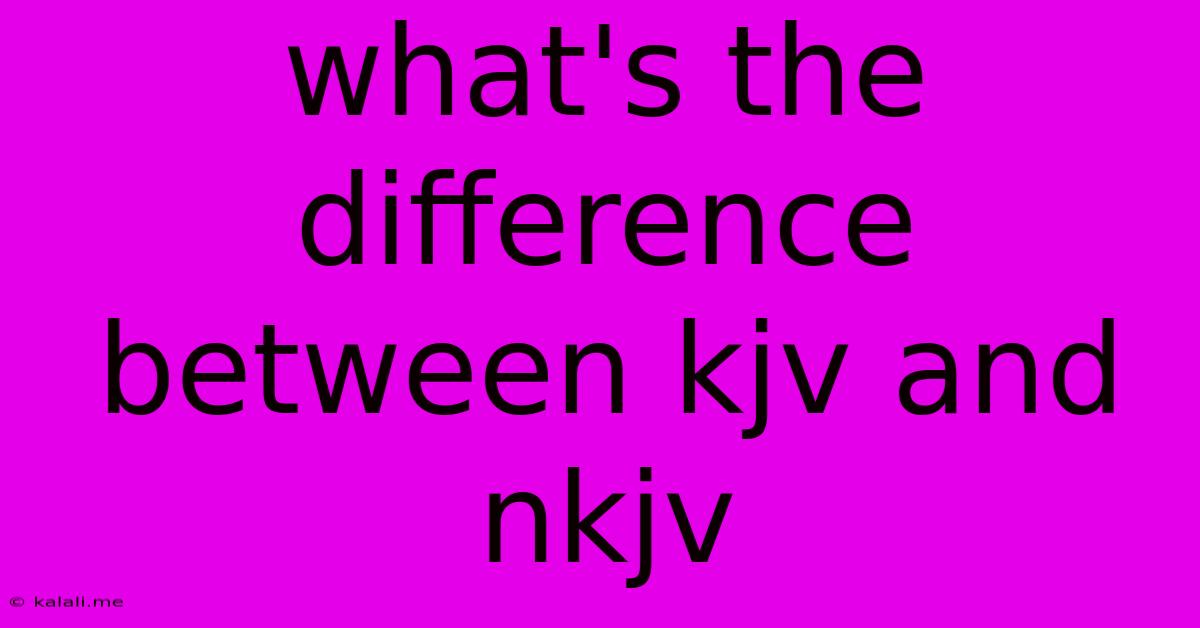What's The Difference Between Kjv And Nkjv
Kalali
Jun 10, 2025 · 3 min read

Table of Contents
What's the Difference Between KJV and NKJV? A Comprehensive Comparison
The King James Version (KJV) and the New King James Version (NKJV) are two of the most popular English translations of the Bible. While both versions share a lineage and retain a similar feel, several key differences exist, affecting readability, accuracy, and overall interpretation. This article will delve into those differences, helping you understand which version might be best suited for your needs. Choosing between the KJV and NKJV often comes down to personal preference, but knowing the nuances can guide your selection.
Understanding the Historical Context:
The KJV, translated in the early 17th century, is renowned for its beautiful, archaic language and enduring influence on English literature. Its translators aimed for a literal translation, striving to render the original Hebrew and Greek texts as directly as possible into English. However, this literal approach sometimes sacrifices clarity and natural flow.
The NKJV, published in 1982, sought to update the KJV while maintaining its traditional feel. Translators aimed to modernize the language, making it more accessible to contemporary readers without sacrificing the KJV's inherent theological accuracy. They used updated scholarship and a deeper understanding of the original languages.
Key Differences Between KJV and NKJV:
1. Language and Readability:
-
KJV: Employs archaic language, including words and phrases no longer commonly used. This can make it challenging for modern readers to understand fully without consulting a glossary or concordance. The sentence structure can also be complex and lengthy. Think of it as Shakespearean English applied to scripture.
-
NKJV: Uses modern English, making it significantly easier to read and understand. The vocabulary is updated, and the sentence structures are more contemporary. It retains a formal tone, mirroring the KJV's reverence, but is far more accessible to a modern audience.
2. Accuracy and Translation Philosophy:
-
KJV: A primarily literal translation, prioritizing word-for-word accuracy. However, this approach can sometimes lead to awkward phrasing or misinterpretations due to the limitations of directly translating ancient languages into modern English.
-
NKJV: While still largely literal, the NKJV incorporates updated scholarly understanding of the original texts and seeks to balance literal accuracy with readability. This results in a more natural and nuanced understanding of the text in some instances.
3. Inclusive Language:
-
KJV: Uses exclusively masculine pronouns and language that reflects the social norms of its time. This can be problematic for contemporary readers who prefer more inclusive language.
-
NKJV: Addresses some of the KJV's gender-specific language, making it more inclusive and avoiding potentially outdated gender-specific assumptions. However, it still maintains a largely traditional approach, not completely altering the original text’s wording unless necessary for accuracy.
4. Textual Basis:
Both versions are based on the Masoretic Text (Hebrew Bible) and the Textus Receptus (Greek New Testament). However, the NKJV incorporates some minor adjustments based on newer textual discoveries and scholarship. This means subtle differences in wording may occur in certain verses due to the use of updated textual sources.
Which Version Should You Choose?
The best version for you depends on your individual priorities.
-
Choose the KJV if: You value the historical significance, beautiful archaic language, and a highly literal translation. Be prepared for a steeper learning curve in terms of readability.
-
Choose the NKJV if: You prioritize readability and understandability without sacrificing the traditional theological approach of the KJV. It bridges the gap between a traditional translation and a modern, accessible version.
Ultimately, both the KJV and NKJV offer valuable insights into the scriptures. Understanding their differences allows for a more informed choice, ensuring you select the version that best suits your reading preferences and goals. Consider exploring both versions to determine which resonates most with you and helps you connect with the Word of God.
Latest Posts
Latest Posts
-
It Was Pleasure To Meet You
Jun 11, 2025
-
Can I Use Cornstarch Instead Of Potato Starch
Jun 11, 2025
-
How To Reset A Cars Mileage
Jun 11, 2025
-
Salesforce Flow Clear Out A Record Variable
Jun 11, 2025
-
Why Does My Ac Ice Up
Jun 11, 2025
Related Post
Thank you for visiting our website which covers about What's The Difference Between Kjv And Nkjv . We hope the information provided has been useful to you. Feel free to contact us if you have any questions or need further assistance. See you next time and don't miss to bookmark.